Southeast Asia’s visa-free travel: a magnet for tourists – and trouble
As Singapore, Malaysia and others open their doors to easier travel, concerns mount over rising crime, safety and immigration challenges
Reading Time:6 minutesWhy you can trust SCMP
10
Listen
Further Reading
Malaysia sees spike in Chinese interest in long-term visas under new rules
Chinese students offered paid tours of Singapore’s NUS to earn extra cash
Indonesia to ban construction of hotels in Bali to tackle overdevelopment
China visa-free scheme for Malaysians sparks hope for more travel, business
Discover MORE stories on
Tourism
FOLLOW
now and stay updated with
How India’s growing middle class is reshaping tourism trends in Asia
Forget art, canals and palazzi – football is the real reason to visit Venice
Hotels in Japan, China, draw investors as travel fervour improves returns
Before you go
10Conversations
scmp poll
related topics
Tourism
Singapore
Malaysia
Asia travel
Chinese tourists
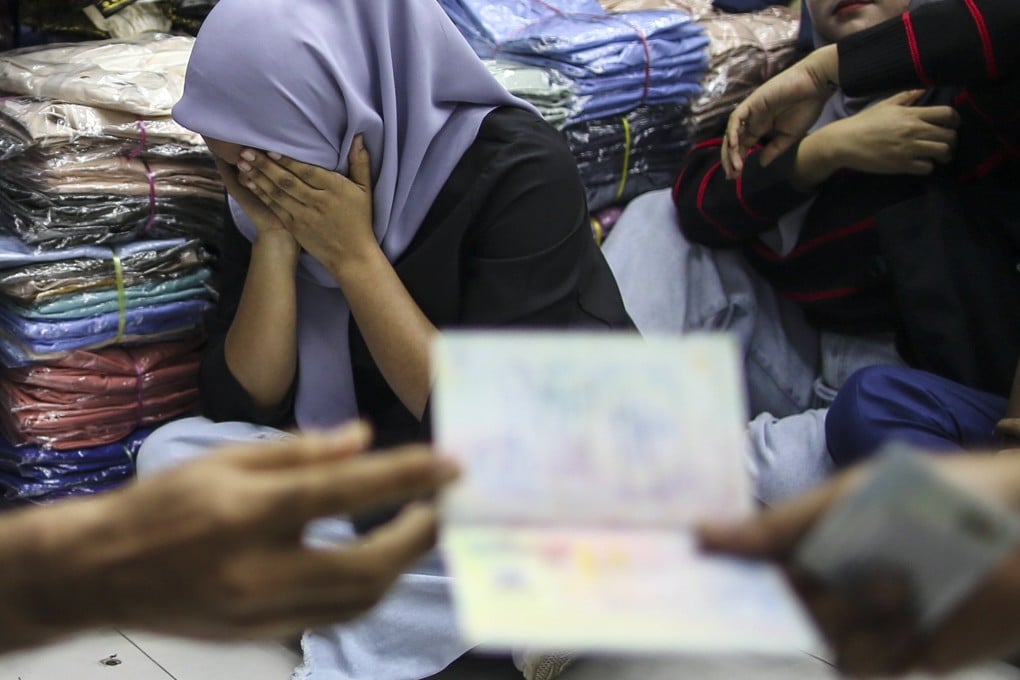
Jean Iau,Kimberly LimandHadi Azmi
Published: 9:00am, 14 Sep 2024
At Singapore’s renowned Gardens by the Bay, 24-year-old Sun Shiqi reflected on her decision to travel abroad for the first time, citing the city state’s visa-free entry for Chinese nationals as a major draw.
“I just had to show my passport when I crossed the border,” the fresh university graduate told This Week in Asia, describing her seamless four-day trip with a friend.
Since February, Chinese travellers have enjoyed visa-free access to Singapore, reciprocated by a 30-day pass for Singaporeans visiting China. This arrangement places them alongside citizens from the US, UK, and other Asean member states who benefit from similar travel privileges.
Visa-free travel has sparked a wave of exploration across Southeast Asia, where tourism is proving essential for economies still recovering from the pandemic – prompting many governments to relax long-standing immigration restrictions.
Travellers from India, China and Russia have emerged as the biggest beneficiaries, flocking to explore the region’s beaches and resorts. Many are venturing abroad for the first time, drawn by the ease of travel that eliminates bureaucratic hurdles.
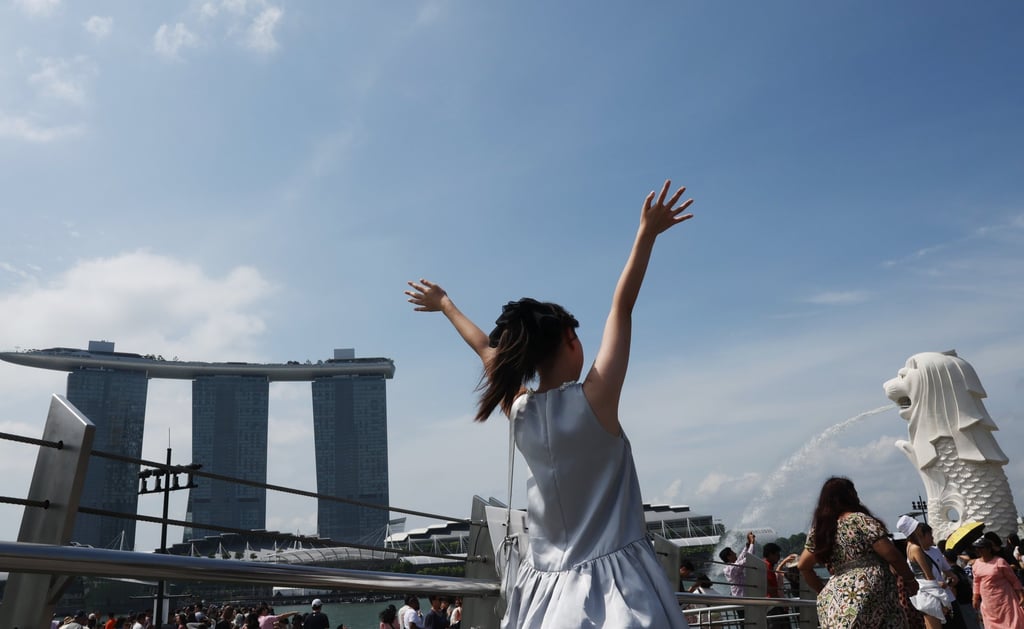
A tourist poses for photos at the Merlion Park in Singapore. Since February, Chinese travellers have enjoyed visa-free access to the city state. Photo: EPA-EFE
For Sun, Singapore was a natural choice – not only is it safe and clean, but it also holds personal significance as the home of one her favourite singers, JJ Lin.
“It’s also great that even though my English isn’t that good, people here understand Mandarin,” she said.
In the tourism hotspots of Phuket and Bali, hotel occupancy rates are soaring back to pre-pandemic levels, flights have resumed to many second- and third-tier Chinese cities, and package tours are also making a comeback. Indian tourists, known for their spending power and lavish wedding celebrations, are flocking to the region, while independent Russian travellers – both the affluent and budget-conscious – are navigating it with new-found ease.
The elimination of stringent visa requirements has opened up the region to a broader range of travellers – Chinese and Indian tourists especially.
Singapore’s 30-day visa-free policy “significantly enhances convenience by eliminating the need for complex visa applications for Chinese travellers”, said Jeremiah Wong, assistant director of marketing communications at Chan Brothers Travel in the city state.
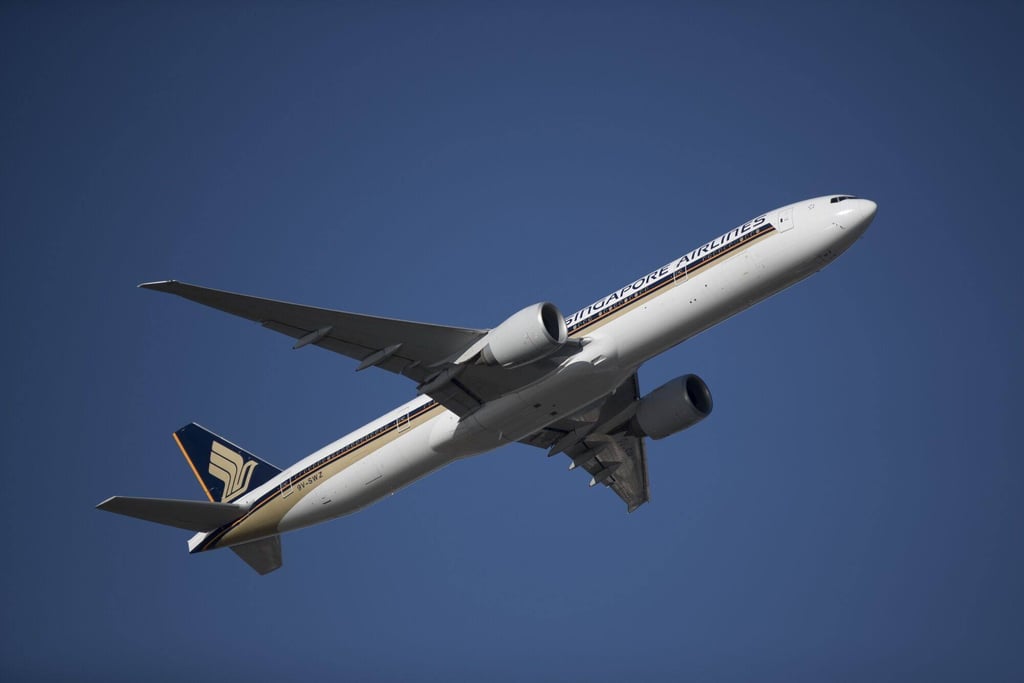
A Singapore Airlines plane takes off. More flights now operate between Singapore and China than before the pandemic. Photo: Bloomberg
“Flight capacity between China and Singapore has exceeded pre-Covid levels, underscoring the strong demand for travel between the two countries,” he added.
But this surge in arrivals, who often go largely unscreened before reaching immigration, has also raised alarms about potential criminal elements entering Southeast Asia.
Reports of illicit activities, including thefts, burglaries and organised crime linked to newly arrived Chinese nationals, have surfaced in Singapore, leading to increased scrutiny.
Last month, three Chinese nationals with ties to foreign syndicates faced charges related to housebreaking incidents in private residential areas of the city state. Authorities say they are working with their counterparts in China to trace another 14 suspects who left Singapore shortly after committing their crimes.
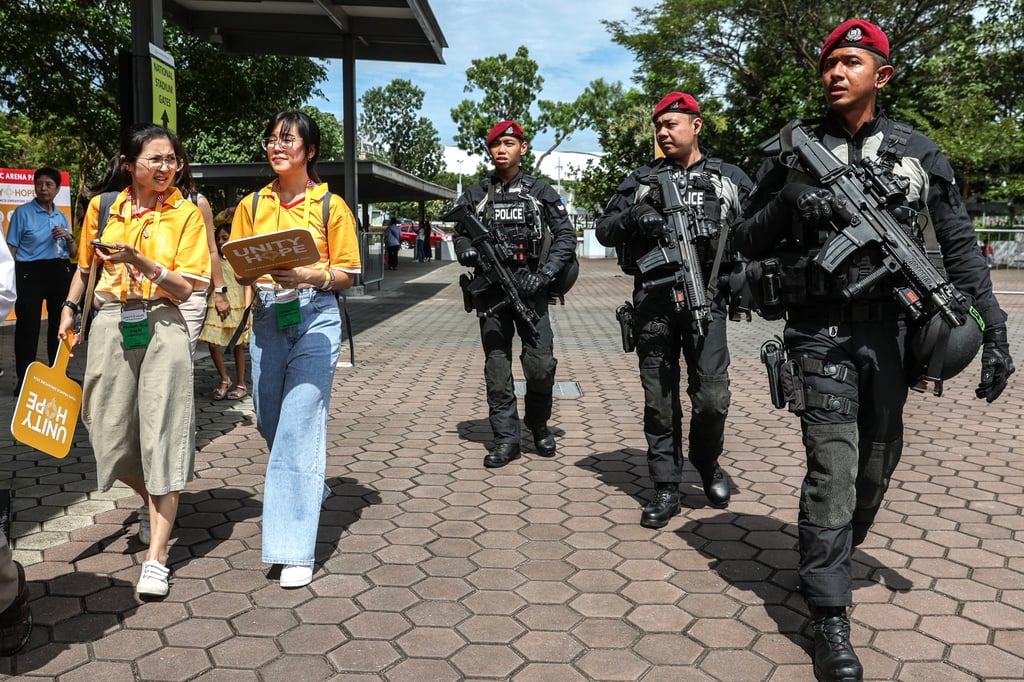
Armed police officers patrol in Singapore. Reports have surfaced recently of illicit activities, including thefts, burglaries and organised crime linked to newly arrived foreigners. Photo: EPA-EFE
No visa regime can completely eliminate undesirable visitors, Minister of State for Home Affairs Sun Xueling emphasised on Monday in response to a parliamentary question regarding crime rates since the visa exemption.
“Even if the 14 Chinese nationals were taken into account, the percentage of Chinese visitors arrested in Singapore would be lower than the corresponding percentage last year,” she said, without giving exact figures.
The only way to keep out bad actors entirely would be to close the country’s borders “but doing so would destroy Singapore’s economy”, she said.
As it strives to stake its claim as one of Southeast Asia’s must-visit destinations, Singapore has rolled out a series of initiatives to attract tourists.
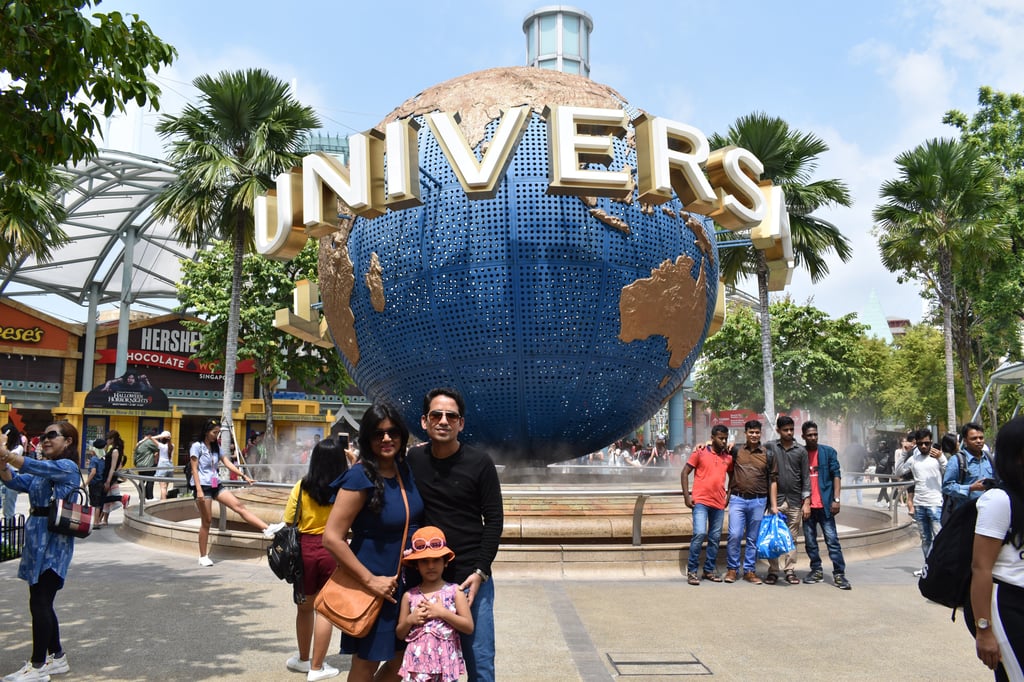
Indian tourists pose for photos at Universal Studios Singapore. A recently opened Minion Land at the theme park is among the city state’s new attractions. Photo: Shutterstock
Inbound travel has steadily increased since the pandemic – particularly with major concerts by global artists like Coldplay and Taylor Swift drawing in crowds as “Singapore showed that it was a world-class travel destination”, said Tat Yam Suen, founder of local tour operator Monster Day Tours.
Other new attractions include Minion Land at Universal Studios and the Oceanarium at Resorts World Sentosa. But the famously expensive city state’s elevated costs may be deterring some travellers.
“For those picking a country to visit in Southeast Asia, they can decide to go to Malaysia, Thailand or Indonesia, versus Singapore, which is going to be more expensive,” Suen said.
“The Singapore currency is very strong, especially compared to our neighbours.”
The Singapore currency is very strong, especially compared to our neighbours
Tat Yam Suen, tour operator
Local frustrations over overtourism are also becoming more common. At the National University of Singapore, for instance, a recent influx of Chinese tourists disrupted classes, prompting the university to implement measures to manage visitor traffic.
A two-month pilot initiative launched in August involving 40 paid undergraduate students leading guided tours helped to balance tourist interest with the educational environment.
This was a case of “tourist overpopulation”, in Suen’s words – though he noted that the phenomenon hasn’t reached the extremes seen in popular destinations like Japan or Bali.
Singapore’s visitor arrivals last year were dominated by tourists from Indonesia, China and Malaysia, according to the city state’s tourism board – contributing 2.3 million, 1.4 million, and 1.1 million visitors, respectively.
Chinese travellers were the highest spenders, pouring S$2.3 billion (US$1.8 billion) into the local economy, followed closely by visitors from Indonesia and Australia, who contributed S$2.2 billion and S$1.5 billion, respectively. Since the introduction of the 30-day mutual visa-free arrangement between Singapore and China earlier this year, Suen said he had observed a notable increase in Chinese tourists seeking “unique and enriching” experiences.
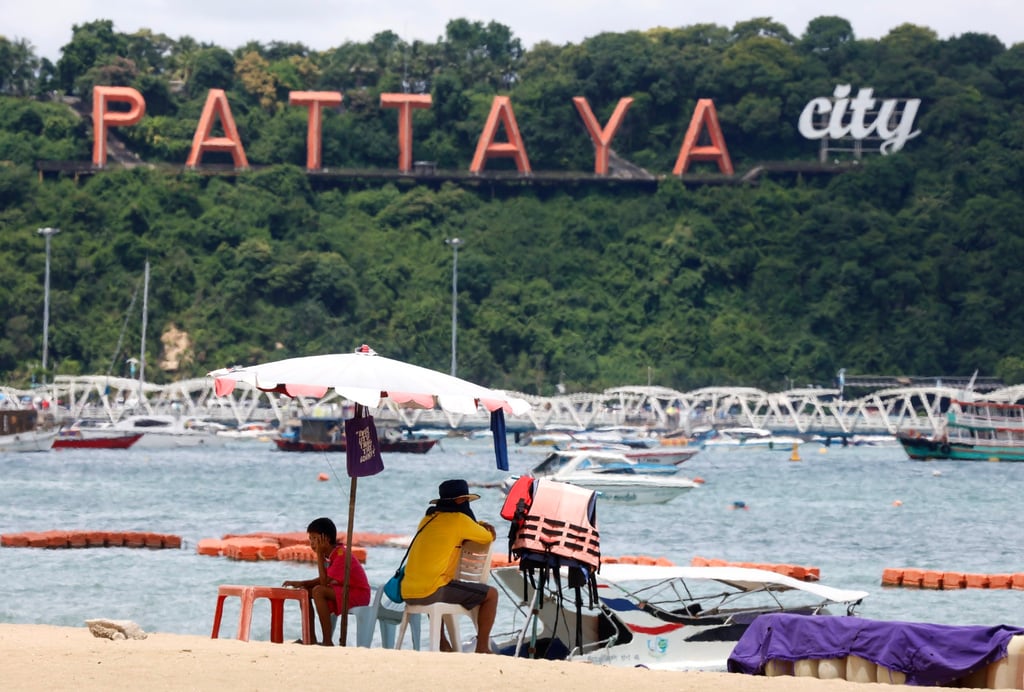
Speedboat operators wait for customers in the resort city of Pattaya, eastern Thailand’s Chonburi province. Photo: EPA-EFE
However, in the darker corners of Southeast Asia, where corruption erodes the rule of law, the easing of visa restrictions has also attracted a wave of criminals looking to exploit the situation.
Late last month, Thai authorities raided a luxury villa in Chonburi, arresting 15 alleged scammers from China who had entered the country unscreened. The area, close to the resort town of Pattaya, is known for its clubs and businesses catering specifically to Chinese clientele.
These suspects are part of a broader list of criminals – many wanted by Chinese authorities – who have found a foothold in Thailand, bolstered by profits from online scams targeting their compatriots back home.
The dark world of Asia’s online casino industry
The issue extends beyond Chinese nationals. Thai police have also apprehended Russians, who have been allowed to stay visa-free for 90 days since last October, for establishing illegal enterprises catering to the affluent newcomers.
In Phuket, locals lament soaring land prices and rising rental costs, as expatriates of various nationalities flood in. Businesses, from taxis to hair salons, are increasingly oriented towards serving this new, wealthy demographic – as Russians fleeing conscription or just seeking refuge from the war in Ukraine head for sunnier climes.
Similar grievances have rippled out from Indonesia’s famed tourist island of Bali. Yet, despite the challenges, both destinations remain deeply committed to attracting high volumes of visitors, recognising that billions of tourist dollars contribute heavily to their economic growth.
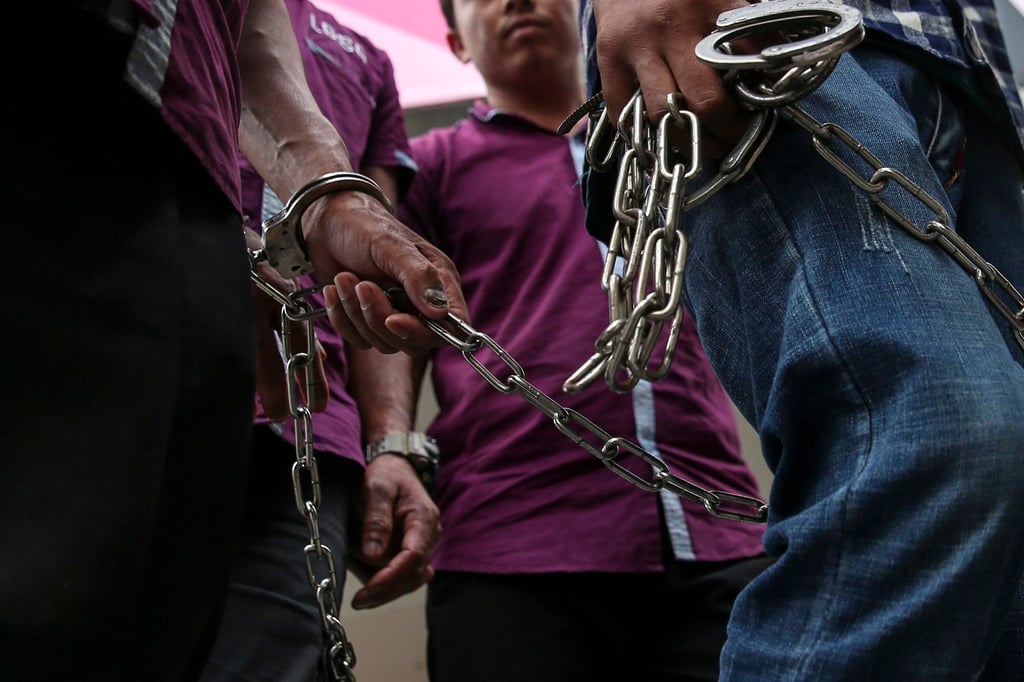
Immigrants working illegally in Malaysia are seen handcuffed during an immigration raid in Klang, outside Kuala Lumpur, last month. Photo: EPA-EFE
Illegal work
In front of the historic Masjid India mosque in Kuala Lumpur, bookshop owner Erfan Ghani reflects on the changing demographics of his neighbourhood. Many foreigners, who initially came as tourists, are now staying longer, altering the character and cohesion of the area, he says.“They come here on tourist visas, but work illegally,” said Erfan, who has operated his shop in the Wisma Yakin business complex across from the 141-year-old mosque for more than 30 years.
The issue of people abusing and overstaying their visas is adding to existing tensions in Malaysian society regarding the influx of migrant workers. The country relies heavily on cheap labour from Bangladesh and Indonesia, yet many locals remain uneasy about the sheer number of workers needed to staff restaurants, farms and construction sites.
At a nearby apartment complex on Jalan Masjid India, Bangladeshi migrant Muhammad Ibrahim, who runs a small restaurant for his community, confirms that illegal work by those on tourist visas is common.
They come here to work, sell things, and then they go back
Erfan Ghani, Kuala Lumpur bookseller
“They come here to work, sell things, and then they go back,” he told This Week in Asia, before adding: “I love Malaysia and I respect Malaysian law.”
Government statistics reveal that between 2020 and last year, 13,242 foreign nationals were arrested for overstaying their visas. Malaysia maintains a relatively lenient border policy, previously requiring only 35 countries, including China and India, to obtain visas before entering.
In a bid to boost its vital tourism sector, the Southeast Asian nation removed visa requirements for travellers from China and India starting December 1 last year. However, this leniency has had its drawbacks.
In a late August raid around holiday resorts in Semporna, Sabah state, immigration officers detained 61 men from China and the Philippines for illegal work after they had entered the country on tourist visas and overstayed by three months.
“They were supposed to leave by May,” Sabah immigration chief Sharifah Sitti Saleha said at the time. “But there are agents and masterminds managing them, making them dare to overstay.”
Despite the immigration department’s efforts to curb overstays through raids, the core issue may lie within the department itself. The influx of unscreened arrivals has exposed vulnerabilities to corruption.
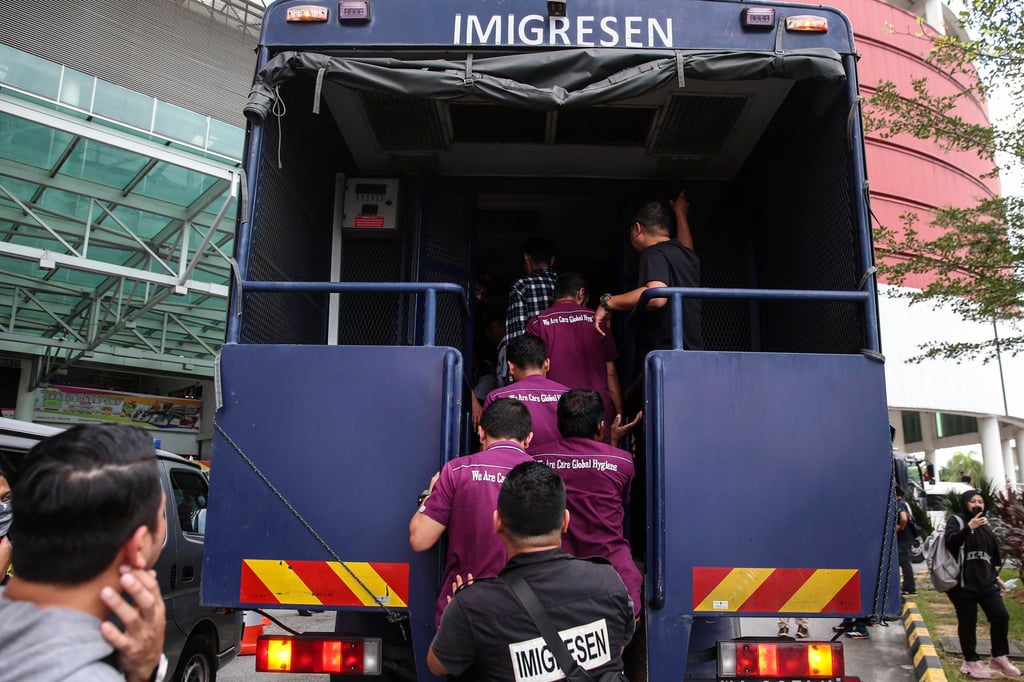
Immigration officers detain migrants who have overstayed their visas during a raid in Klang, Malaysia, on August 15. Photo: EPA-EFE
On September 4, the Malaysian Anti-Corruption Commission revealed that up to 46 immigration officers at Kuala Lumpur International Airport were suspected of being part of a syndicate facilitating the entry of foreigners.
“We need to unravel the problem,” said commission chief Azam Baki. “We have warned many times before, but the case is still happening. Before it gets worse, we take immediate action.”
The airport syndicate is believed to have generated as much as 4 million ringgit (US$922,000) from their operations between 2022 and this year. This follows a 2020 incident in which 36 immigration officers were arrested at the airport and Malaysia’s border with Singapore at Johor Bahru for their involvement in falsifying travel document stamps.
Ramlan Arshad, a border and migration expert at Mara Technological University in Kuala Lumpur, emphasised the need for robust enforcement to ensure that only bona fide tourists enter the country.
“If it is not correctly controlled, Malaysia will become a hub for those with a clear intention to overstay,” he said.

